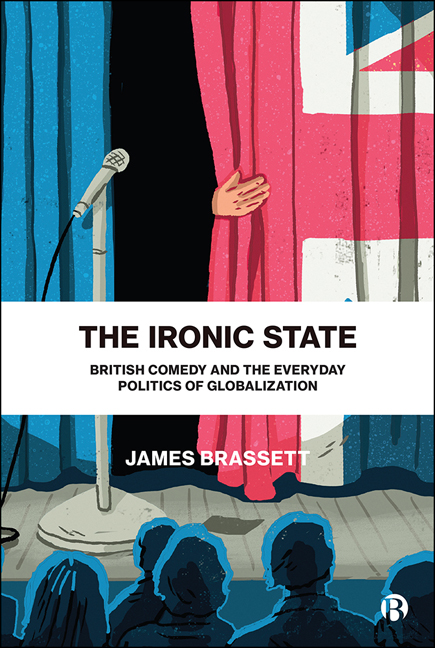Book contents
- Frontmatter
- Contents
- Acknowledgements
- Introduction: Comedy and the Politics of (Global) Resistance
- 1 Everyday Comic Resistance in Global Context
- 2 The Satire Boom: Imperial Decline and the Rise of the Everyday Elite
- 3 Alternative Comedy and Resistance to ‘Thatcher’s Britain’
- 4 Irony and the Liminality of Resistance
- 5 Austerity and the Rise of Radical Comedy
- 6 Brexit, or How I Learned to Stop Worrying and Love the Single Market
- 7 The Globalization of Comic Resistance?
- Bibliography
- Index
2 - The Satire Boom: Imperial Decline and the Rise of the Everyday Elite
Published online by Cambridge University Press: 04 January 2022
- Frontmatter
- Contents
- Acknowledgements
- Introduction: Comedy and the Politics of (Global) Resistance
- 1 Everyday Comic Resistance in Global Context
- 2 The Satire Boom: Imperial Decline and the Rise of the Everyday Elite
- 3 Alternative Comedy and Resistance to ‘Thatcher’s Britain’
- 4 Irony and the Liminality of Resistance
- 5 Austerity and the Rise of Radical Comedy
- 6 Brexit, or How I Learned to Stop Worrying and Love the Single Market
- 7 The Globalization of Comic Resistance?
- Bibliography
- Index
Summary
Introduction
The origins of the ‘satire boom’ in 1950s Britain might seem curious. While the end of the Second World War brought relief (and the good fortune of victory), the nation had to adapt to some stark realities. The war had been costly, in human and economic terms. At the same time, the superior wealth and power of the US served as a demonstration of the changing position of Britain in global politics. The US was a former colony, and just as it reached preponderance, there were a growing number of national independence movements turning against British rule. The rise to popularity of satire happened during a period of acute decline, loss of political self-confidence and protracted self-analysis. As Stuart Ward (2001a: 12) argues: ‘Ideas about British “character” … became difficult to sustain as the external prop of the imperial world was progressively weakened. Notions of duty, service, loyalty, deference, stoic endurance and self-restraint and gentlemanly conduct were insidiously undermined by the steady erosion of the imperial edifice.’
Thinking about the satire boom as an everyday practice of resistance must therefore reflect and engage this politics of imperial decline; part of the cultural negotiation of this erosion of global power. Domestically, the late 1940s and early 1950s saw the implementation of austerity policies, many which went further than war-time rationing (Carpenter, 2000: 4–5). Internationally, this once ‘great’ and ‘proud nation’ that had been victorious in the ‘two world wars’, now faced palpable questions – both military and moral – about how to maintain global influence, a problematic that crystallized with the Suez crisis (Carpenter, 2000: 9–11). Widely seen as a national humiliation, Suez underlined how the politics of imperial decline would unfold in ways that fundamentally questioned the self-identity of British political culture, with its confidence, deference and bloody mindedness. Again, why did the ‘satire boom’ happen during this period? What was it about the combination of austerity and imperial decline that created so much (demand for) comedy? What is the ‘global’ significance of this growing British interest in humour, wit and irony?
- Type
- Chapter
- Information
- The Ironic StateBritish Comedy and the Everyday Politics of Globalization, pp. 37 - 56Publisher: Bristol University PressPrint publication year: 2021



